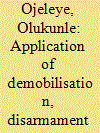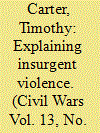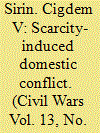| Srl | Item |
| 1 |
ID:
107801


|
|
|
|
|
| Publication |
2011.
|
| Summary/Abstract |
The oil- and gas-rich Niger Delta region, plagued by violence and dominated by armed militant gangs, typifies the new face of conflict which second generation demobilisation, disarmament and reintegration (DDR) approaches are meant to address at the sub-national level. Fundamental to the emergence of militant gangs and the militarisation of civil society in Nigeria is the federal system of government and its attendant political, social and economic imbalances. This article advances the argument that the implementation of a detailed DDR programme that addresses the governance, ethnic politics, resource control, revenue distribution and national integration issues at the root of the tensions in the troubled oil- and gas-rich region will yield a greater peace dividend for all stakeholders in contrast to the current amnesty programme of the Nigerian government. This programme has been fraught with setbacks and mistrust from its client group (the militants). In so doing, DDR at the sub-national level in the Niger Delta would serve as a tool to achieve peace and long-term stability in the nation not only by removing the tools of violence - weapons and ammunition - from the militants and the civilian population but also by removing the sources of violence as reflected in socio-economic and political inequality within the Nigerian state.
|
|
|
|
|
|
|
|
|
|
|
|
|
|
|
|
| 2 |
ID:
107803


|
|
|
|
|
| Publication |
2011.
|
| Summary/Abstract |
This article examines the implications of two distinct phases of international engagement in Kosovo. We argue that a number of flaws developed during UNMIK's administration (1999-2008), which continue to undermine Kosovo's stability. We then disentangle the complex inter-institutional relations between ICO, EULEX, UNMIK and the OSCE. Indeed, their incompatible positions towards Kosovo's status results in a lack of clarity, coordination and coherence that weaken Kosovo within four policy areas: Kosovo's international recognition and participation, the rule of law, inter-ethnic relations and the fate of North Kosovo. While these shortcomings could be viewed as 'unintended consequences', we argue more broadly that the Kosovo case illustrates the limits of liberal peacebuilding and the tensions and implications of strategic peacebuilding.
|
|
|
|
|
|
|
|
|
|
|
|
|
|
|
|
| 3 |
ID:
107802


|
|
|
|
|
| Publication |
2011.
|
| Summary/Abstract |
This article analyzes the previous and current dynamics of the arms trafficking network of the former Liberation Tigers of Tamil Eelam (LTTE) in Asia and its relevance for the post-conflict situation in Sri Lanka. It also analyzes some of the leading western theories on civil war and determines their relevance in this specific theater. Further analysis is provided regarding the state of the Tamil diaspora as well as the remainder of the LTTE's financial network. This article argues that the governments in Asia that house key sources of weaponry and other supplies for violent nonstate actors do not seem either willing or able to take any kind of meaningful action against these illicit markets aside from making occasional high-profile arrests. Further, key former LTTE financiers continue to reside in several western countries and many remain willing to underwrite arms smuggling operations in Asia, provided that there are effective managers. Given these realities combined with a nascent government-in-exile that continues to espouse the LTTE's raison d'être, the insurgency in Sri Lanka could reignite quicker and more intensely than most think if current political and demographic trends are not reversed and force levels of the Sri Lankan military cannot be sustained. However, any new Tamil militant groups would likely look quite different from their LTTE predecessors.
|
|
|
|
|
|
|
|
|
|
|
|
|
|
|
|
| 4 |
ID:
107799


|
|
|
|
|
| Publication |
2011.
|
| Summary/Abstract |
The ongoing war in Afghanistan presents many questions for both scholars and policymakers. In particular, understanding insurgent military behavior generates considerable interest. Using a newly assembled daily, province-level data set, I begin to study the violence, focusing on the timing of US and allied fatalities in the war. I evaluate arguments commonly made about those elements favoring insurgent military success, proximity to resupply and difficult terrain, and find strong evidence supporting the first but less supporting the second as determinants of coalition fatalities. In addition, I find significant evidence linking factors unexamined in most civil war research, such as religious observance (the month of Ramadan) and warm weather, to these fatal events.
|
|
|
|
|
|
|
|
|
|
|
|
|
|
|
|
| 5 |
ID:
107798


|
|
|
|
|
| Publication |
2011.
|
| Summary/Abstract |
This article explores the effect of political and institutional constraints on negotiations that seek to end civil wars. Two aspects of negotiations are statistically examined. Greater political constraints on the leaders of states appear to have no effect on the likelihood of negotiations taking place, but greater political constraints do reduce the likelihood of negotiations succeeding. The results of this analysis demonstrate that political constraints are a powerful factor driving the likelihood of negotiation success. The article concludes with a discussion of why political constraints do not produce a similar reduction in the likelihood of negotiations.
|
|
|
|
|
|
|
|
|
|
|
|
|
|
|
|
| 6 |
ID:
107800


|
|
|
|
|
| Publication |
2011.
|
| Summary/Abstract |
This study argues that environmental scarcity is more likely to result in civil conflict in countries that experience 'ethnic' population pressures (i.e. where the size of the largest minority group is close to parity with the majority group). I refer to this argument as the 'parity-threat' approach to the study of scarcity-induced domestic conflict. I empirically test my argument by analysing time-series cross-section data for the period 1979-2000 using four alternative environmental indicators: (1) ecological footprint, (2) biocapacity, (3) scarcity of ecological reserves and (4) water scarcity. The results demonstrate that environmental scarcity increases the probability of civil conflict when conditioned by 'ethnic' population pressures.
|
|
|
|
|
|
|
|
|
|
|
|
|
|
|
|